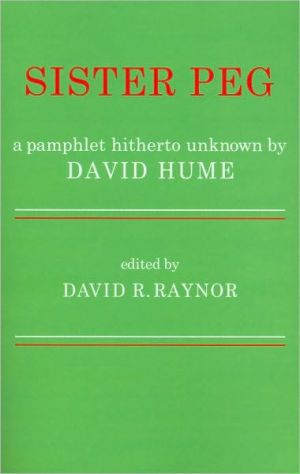Sister Peg: A Pamphlet Hitherto Unknown by David Hume
Scholars have known for some years that in 1760 Hume write a humorous satire against William Pitt the Elder. Mr Raynor argues that this hitherto unlocated work is Sister Peg, an anonymous publication which has been traditionally ascribed to Adam Ferguson. This witty and occasionally malicious Scriblerian piece was composed as a sequel to Dr John Arbuthnot's famous History of John Bull (1712). Hume's satirical allegory recounts the relations between England (John Bull of Bull-hall) and...
Search in google:
The Scottish philosopher and historian David Hume (1711-76) once confessed that he 'would give more to be thought a good Droll, than to have the Praises of Erudition, & Subtility, & Invention'. Scholars have known for some years that in 1760 Hume wrote a humorous satire against William Pitt the Elder. Mr. Raynor argues that this hitherto unlocated work is Sister Peg, an anonymous publication which has been traditionally ascribed to Adam Ferguson. This witty and occasionally malicious Scriblerian piece was composed as a sequel to Dr. John Arbuthnot's famous History of John Bull (1712), a work which Macaulay called 'the most ingenious and humorous political satire extant in our language'. Hume's satirical allegory recounts the relations between England ('John Bill of Bull-hall') and Scotland ('Sister Peg of Thistledown') from earliest times until April 1760, when a bill to extend the militia to Scotland was defeated in parliament due to the opposition of the Duke of Newcastle ('Hubble-bulle'), Lord Hardwicke ('John's Nurse'), and Pitt ('Jowler'). The first part of the satire places this debate in historical perspective. Among the topics touched upon are the Union of Parliaments in 1707; the Jaconite Rebellion of 1745 ('that damned unnatural diabolical hell-fire scamper'); how Britain dependent upon foreign mercenaries ('Rousterdivel') for her defence; the origins of the Seven Years' War; the loss of Minorca; Pitt's rise to power and the expansion of the empire; Admiral Hawke's naval victories; the threat of a French invasion; and the agitation for the re-establishment of a citizen militia. The final chapters of Sister Peg are an imaginary reconstruction of the militia debate in parliament, and constitute an elegant statement of the radical Whig case against a standing mercenary army. Apart from the satire's intrinsic interest and biographical significance, it is an important document for the interpretation of Hume's political theory.
Acknowledgements; Introduction; Notes to introduction; Note on the text; The History of the Proceedings in the Case of Margaret, commonly called Peg, only lawful sister to John Bull, Esq.; Notes to Sister Peg; Bibliography.








